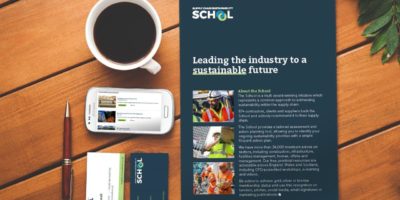About Laing O'Rourke
Laing O’Rourke is a Partner of the Australian Sustainability Supply Chain School. To help deliver on the world-leading sustainability requirements contained in The Armadale Road to North Lake Road Bridge Project, Laing O’Rourke wants our suppliers to join us as members of the School. Getting involved with the School will show your commitment to supporting businesses to make better informed, sustainable and cost-effective decisions.
Learn how to become a member  Sustainability Position Statement
Sustainability Position Statement
Download  Aboriginal Participation Fact Sheet
Aboriginal Participation Fact Sheet
Download  Roads to Reuse Project and Recycled Materials Initiatives presentation
Roads to Reuse Project and Recycled Materials Initiatives presentation
Download  Annual Sustainability Report 2019-2020
Annual Sustainability Report 2019-2020
Download About the Armadale Road to North Lake Road Bridge Project

The Armadale Access Alliance is a consortium comprising Main Roads Western Australia, Laing O’Rourke and BG&E that will deliver a $146 million contract for The Armadale Road to North Lake Road Bridge Project.
Construction is expected to begin in late-2019 and is due for completion in late-2021.
The Project comprises construction of a bridge over the Kwinana Freeway connecting Armadale Road to North Lake Road and construction of free-flowing traffic lanes on Armadale Road through the Solomon Road and Tapper Road intersections. Full connectivity will be retained at the intersections of Solomon Road and Tapper Road through grade separated roundabouts. Design Option B has been selected which includes a trench structure enabling Armadale Road to pass underneath Solomon Road, with the Solomon Road/ Beeliar Drive roundabout supported by twin bridges over the trench.

Refer https://project.mainroads.wa.gov.au/home/armadaleroadbridge/Pages/default.aspx for more detailed information on the Project.
The Project is registered with Infrastructure Sustainability Council Australia seeking a ‘Design and As Built’ rating based on new IS v2.0 Rating Tool, being one of the first projects in Australia to commit to new IS v2.0.
Project Sustainability Objectives are detailed in the Sustainability Position Statement.
As part of our Sustainability Approach, the Project will promote a local, diverse, inclusive workforce by encouraging local contractors, low-tier businesses and indigenous-owned businesses to be part of the Project.
The Project encourages all the Suppliers to have their own Sustainability Policy and assist the Project in driving the following Sustainability Objectives:
Aboriginal participation
Aboriginal Participation is a key driver on this project. The Armadale Access Alliance believes best results for Aboriginal Participation on our project will occur when the Alliance team, our subcontractors and suppliers work respectfully, openly and in collaboration with local Aboriginal communities, Aboriginal businesses, community organizations and employment service providers.
Download the Aboriginal Participation Fact Sheet, a quick reference guide to assist subcontractors to support the Aboriginal Participation outcomes.
Contact the Aboriginal Participation Coordinator, Amanda Inman, on 0400 269 366 or [email protected]
Water Efficiency
- The Suppliers must not use drinking water for tasks where non-potable water would be best to use – e.g. street sweeping / dust suppression, where on-site or local sources of non-potable water are suitable for use in the Suppliers’ Activities and are available.
- All construction equipment requiring water is selected taking into account the water efficiency of the equipment and associated construction methodology.
- The Suppliers are encouraged to explore water-efficient construction methods and incorporate them with their Construction Methodology
Energy and Carbon Efficiency
The Suppliers must undertake initiatives to ensure that all vehicles, plant and equipment, are:
- selected and operated for optimum energy efficiency;
- not left idling when not in use;
- fitted with catalytic converters, diesel particulate filters or equivalent devices where reasonable and feasible; and
- well maintained and serviced in accordance with relevant equipment maintenance documentation to reduce emissions due to poor engine performance.
Minimise material usage
- The Suppliers are encouraged to identify major materials to be used for Suppliers Works and select those materials that have Approved Environmental Labels like Environmental Product Declarations, Green Building Council of Australia approved etc., wherever deemed feasible.
- To reduce on-site waste and meet Project waste targets, the Suppliers are asked to complete the predictive waste form which includes target percentages for the allowable waste of temporary and permanent materials and initiatives to minimise waste and maximise reuse.
- The Suppliers are asked to confirm what arrangements can be put in place to use zero packaging, minimal packaging and have the excess packaging returned to the materials supplier/ manufacturer.
Download the Roads to Reuse Project and Recycled Materials Initiatives presentation from 26 November 2019 to learn from Main Roads WA projects on initiatives to use recycled materials and what this project can do to maximise their use.
Supplier Workshop
 Supplier workshop presentation pack
Supplier workshop presentation pack
Download On 10 September 2019, The Project held a supplier workshop for businesses interested in tendering for material packages. Attendees learned about:
- Main Roads WA key issues for suppliers: circular economy, emissions and women and indigenous in the workforce; and
- Project sustainability requirements and expectations for suppliers: tendering process, evaluation criteria and some specific sustainability targets for suppliers
Sustainable Construction
Green Building Council of Australia
Web link
Sustainable Construction
Reducing the Environmental Impact of Road Construction
Web link
Climate Change Adaptation
Task Force on Climate-related Financial Disclosures (TCFD) Overview
Web link
Local community and economy
Guide to Best Practice for Safer Construction: Principles
Tool
About the Supply Chain Sustainability School


 Sustainability Position Statement
Sustainability Position Statement 10 minutes
10 minutes